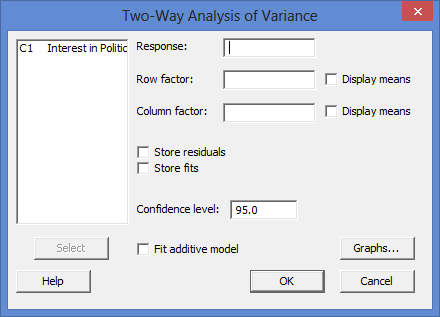

Among the output Minitab provides is our handy Table of Percentiles, including our value for B15 life-or the time at which 15% of the items in our population will fail.Ĭollecting warranty data and doing warranty analysis in Minitab shouldn’t prevent you from using reliability tools and metrics, such as BX life. When we OK out of these dialogs, Minitab performs the analysis. We’ll assume the Weibull distribution fits our data.Ĭlick the Estimate button to enter percents to be estimated in addition to what’s provided in the default output (In our case, let’s ask for B15 Life-so enter a 15 in “Estimate percentiles for these additional percents”). Enter Start time in “Start variables,” End time in “End variables,” and Frequencies in “Frequency columns (optional).” Also, make sure you have the appropriate assumed distribution selected. You can now use these columns to obtain BX life using Stat > Reliability/Survival > Distribution Analysis (Arbitrary Censoring) > Parametric Distribution Analysis. The Pre-Process step creates Start time, End time, and Frequencies columns in your worksheet! For “Return (failure) columns,” enter Month1-Month12.

For “Shipment (sale) column,” enter Ship. Select Stat > Reliability/Survival > Warranty Analysis > Pre-Process Warranty Data. If you’d like to follow along and you’re using Minitab 17.3, navigate to Help > Sample Data and select the Compressor.MTW file.įrom here, you can use Minitab’s Pre-Process Warranty Data to reshape your data from triangular matrix format into interval censoring format. To demonstrate, let’s start with a new example and new data. Minitab has a tool that helps you convert shipping and warranty return data from matrix form into a standard reliability data form of failures.Ĭonvert your data from a matrix form for easy analysis! And when several shipments are made at different dates and their corresponding returns noted, the recorded data are in the form of a triangular matrix. It’s common to keep track of reliability field data in the form of number of items shipped and number of items returned from a particular shipment over time.
MINITAB EXPRESS RANDOM DATA HOW TO
Naturally, someone doing warranty analysis in Minitab should want to compute this value too! But looking at raw reliability field data, which are recorded in the form of a triangular matrix, it’s not obvious how to compute B10 life! So a manufacturer might set a warranty period after a product’s B10 life, for instance, with the goal of minimizing the number of customers who will take advantage of the warranty should the product they purchase fail within the warranty period. Why? Because it indicates the time at which X% of items in a population will fail.
MINITAB EXPRESS RANDOM DATA SERIES
But before I round out my BX life blog series with rationale for why BX life is one of the best measures for reliability, I thought I’d take this opportunity to address the LinkedIn question-as you might wonder the same thing.īX Life can be a useful metric for establishing warranty periods for products. My second post, How to Calculate BX Life, Part 2, shows how to compute any BX life in Minitab. In case you missed it, my first post, How to Calculate B10 Life with Statistical Software, explains what B10 life is and how Minitab calculates this value. That is, until this question appeared on the Minitab LinkedIn group: I thought 3 posts would capture all the thoughts I had about B10 Life.


 0 kommentar(er)
0 kommentar(er)
